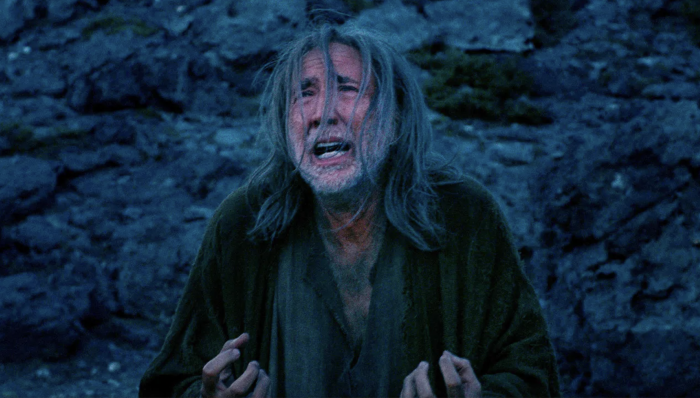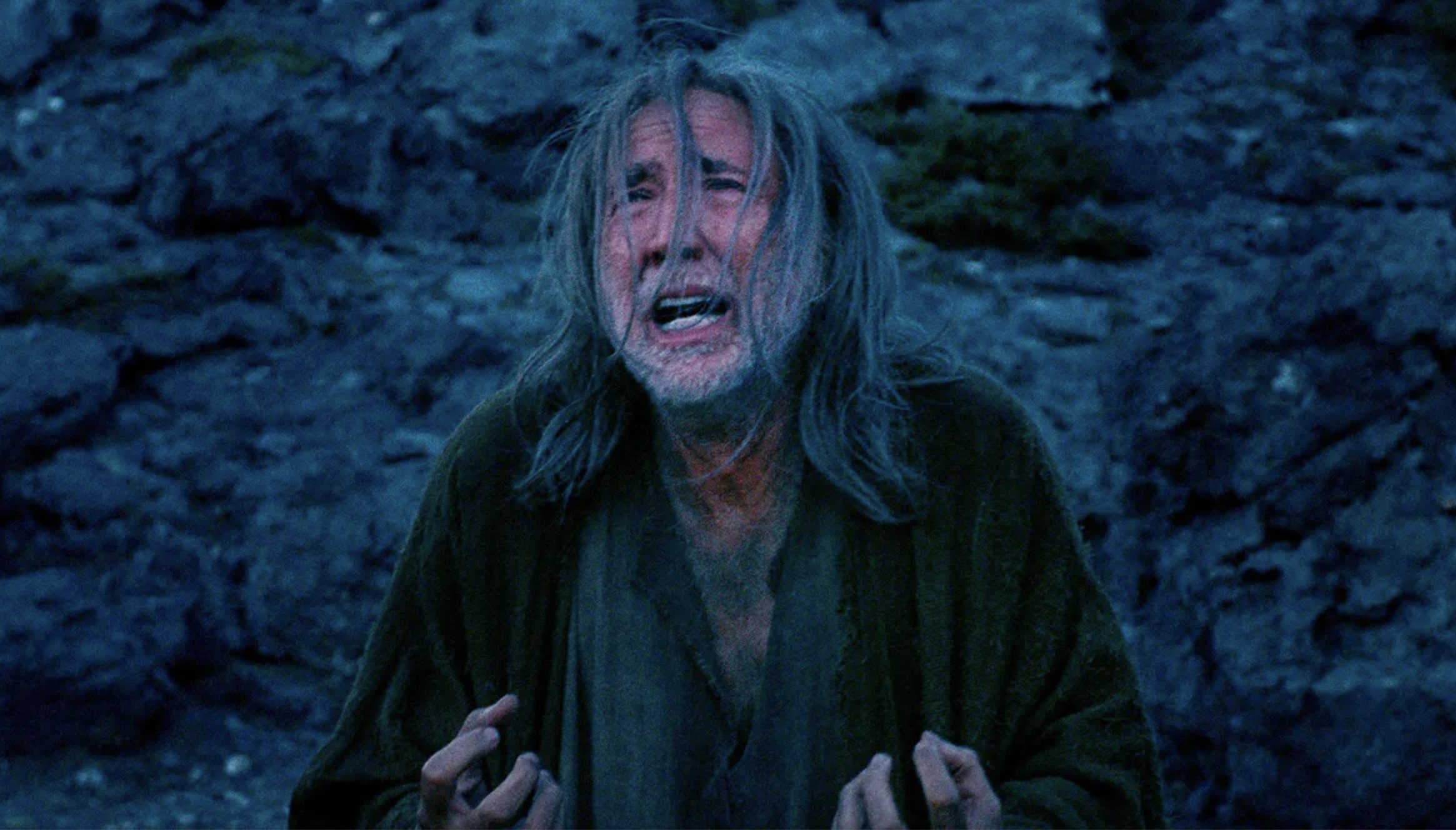
Writer-director Lotfy Nathan wants viewers to see “The Carpenter’s Son” as a bold artistic experiment; a “supernatural thriller” exploring the unrecorded years of Jesus’ youth.
But for most Christian audiences, the film is likely to register less as daring and more as deeply disturbing.
The film, starring Nicolas Cage as Joseph (“The Carpenter”), FKA Twigs as Mary (“Mother”) and Noah Jupe as a teenage Jesus (“The Boy”), reimagines Christ’s adolescence as a psychological and supernatural struggle between good and evil.
The film opens with Herod’s soldiers hurling infants into fires in Bethlehem in a frenzied attempt to eliminate the newborn Christ. The Holy Family subsequently flees into exile, ducking Roman patrols and sheltering The Boy from forces seen and unseen. Eventually, they settle in a remote Egyptian village, but the danger never subsides.
Drawing from the Infancy Gospel of Thomas, an apocryphal text rejected by the Church centuries ago, Nathan invents scenes in which Jesus kills a child, resurrects insects and leers at a naked woman showering before being tempted by “The Stranger” (Isla Johnston), a devil incarnated as a teenage girl.
Shot in Greece and styled as a gritty period piece during Jesus’ “lost years,” critics have praised its atmospheric cinematography and Cage’s tortured performance, but for Christians who hold Jesus’ sinlessness as central to the faith, the film’s premise will feel blasphemous.
In a recent interview with The Christian Post, Nathan, a British-American writer-director, acknowledged the controversy surrounding the project, noting that everyone has “seemed curious” about his motivation.
“They ask, ‘Is there some kind of agenda?’ But with those who have seen the film, there’s a more nuanced conversation,” he said.
Nathan said the idea came from discovering the Infancy Gospel of Thomas, a noncanonical text that imagines the boy Jesus performing miracles and committing acts of violence.
“I can understand why it’s not canonical,” he said. “It’s pretty brutal, pretty rough.”
Still, the filmmaker, who was born in Egypt and grew up in the Coptic Orthodox Church, saw it as fertile ground for artistic exploration. “I hadn’t seen a film that delved into the missing timeline in the New Testament,” he explained. “This was the time when Jesus would have been living under the protected obscurity of being the carpenter’s son.”
In Nathan’s telling, that obscurity was the inspiration for the unnervingly human and, at times, morally compromised, teenage Messiah.
“There’s a big spectrum in Christianity,” he said. “My own family, as Coptic Orthodox, would immediately not sign on to this story with the image of Jesus as someone who had human vulnerability.”
But to Nathan, the story’s purpose isn’t provocation for its own sake, but a way to explore what he called “human vulnerability” in the divine.
“I was fascinated and ended up taking a bit of a leap in thinking, ‘What if Jesus and Satan had an encounter prior to the temptation in the desert?” he said. “That became something interesting to me. It also appealed to me to make a biblical film that could bring more people in … with a narrative that was maybe a little bit challenging as well.”
“It was a dance, and I was always worried about going too far with that, and it’s already kind of rocky terrain, this adaptation. But I just tried to find things that I thought could fit in that missing timeline.”
That approach, however, turns traditional Christology on its head. In the Gospels, Jesus is described as “without sin.” In “The Carpenter’s Son,” he is shown as a confused adolescent drawn toward darkness and occasionally overtaken by it.
However, Nathan, who worked with Katell Bethelot, a French academic specializing in ancient Judaism, to bring the project to life, stressed that horror is integral to the biblical imagination, adding, “If you look at the Bible objectively, that would be the genre. It’s built in.”
He cited Old Testament stories of judgment, plagues, brutal killings and demonic encounters as evidence that fear and faith are intertwined, a concept many theologians have tackled over the centuries.
“There’s a reticence sometimes to see it that way because it seems unsanitary,” he said. “But I think that’s a strength … to me, it’s exciting, no more different than using a different palette of colors. Not necessarily the bright, clean version, but something tactile and vivid.”
“The Carpenter’s Son” joins a long tradition of filmmakers who have sought to reinterpret Jesus for modern audiences, from Martin Scorsese’s highly controversial “The Last Temptation of Christ” to Mel Gibson’s more reverent “The Passion of the Christ.”
Critics have argued that the problem with Nathan’s film is not that he asks questions, but that he answers them in ways that contradict the central tenets of Christian faith, particularly depicting Jesus as sinful or morally uncertain.
Nathan described his film as a “dance” between reverence and risk and an exploration of the human condition. But he acknowledged that those seeking a portrayal of Christ aligned with the biblical narrative, one rooted in holiness, will not appreciate his film.
“Merely depicting Jesus as a person who could have had human vulnerability, in their belief, in their psychology, a lot of Christians just won't agree with that; it’s not allowed,” he said.
“That's not something I would even try to appeal to people to look at in a different way. It's not for me to do that. For me, I think that it's interesting and makes me feel closer to the story, to be able to see that Jesus suffered in more ways than just the physical.”
Still, he expressed hope that the film would reach “a religious audience who is interested in the art and inspiration that comes in art with the biblical story.”
“I think about the Sistine Chapel, for example, this gradient between Heaven and Hell and just how dramatic that is, and it's all about context,” he said. “I think that just showing the dark side is how you define the triumph and the good.”
While Nathan rejects the idea that the production was plagued by spiritual warfare, despite reports of Nicolas Cage being swarmed by insects on set, he said he approached the material with caution.
“I was wary going in,” he said. “Just trying to get it right, at least by my measure.”
The film’s very existence reveals a cultural shift: Jesus is still a subject of fascination in Hollywood, but increasingly as a character to be reinterpreted rather than revered. For those who see Him as Lord and Savior, that distinction is everything.
But according to Nathan, by the end of the film, he felt spiritually changed by the process, particularly by the contrast of good and evil, and closer to the faith of his childhood.
“In a bizarre way, having to write the script, I had to write for the devil as well because the whole effort of the film was to try to characterize everybody as much as possible,” he reflected. “I felt by the end that there's this cynical, bleak view about humanity that is embodied in the darkness, and we all feel that sometimes."
“But then you have these virtues of forgiveness and optimism ... lessons for me having to do with this film, that's really what I took away — the acknowledgement of the bad, but then still deciding to try to go towards something better. I ended up spending a lot of time rereading [Scripture]. I drifted away from faith over the years, but this, in a way, really brought me back to a lot of subscribing to the story.”
News Source : https://www.christianpost.com/news/the-carpenters-son-director-defends-controversial-jesus-film.html
 Your post is being uploaded. Please don't close or refresh the page.
Your post is being uploaded. Please don't close or refresh the page.





